Physiotherapist | 7 min read
What Is Panchakarma In Ayurveda: Health Benefits And Steps
Medically reviewed by
Table of Content
Key Takeaways
- Panchakarma treatment balances both your body and mind
- Improving digestion is one of the unique panchakarma benefits
- Taking this ayurvedic treatment can help balance all doshas of your body
Ayurveda employs different methods of rejuvenation and purification in the form of healing therapies. These help you lead a healthy and active life. Going for an ayurvedic treatment helps your body and mind work harmoniously with each other. One such cleansing process is panchakarma. This technique involves five actions that help eliminate impurities from your body. Panchakarma advocates the use of medicated oils for boosting immunity and relieving stress [].
Read on to know more about ayurvedic panchakarma treatment and how it is beneficial for your well-being.
What is Panchakarma Treatment?
Ayurveda correctly emphasizes that health is not only the absence of disease but also the normalcy of Dosha, Dathu, Agni, and Malakriya. The Prasanna Atma (soul), Indriya (sense organs), and Mamas are also included (mind).
The human body is kept in balance by three doshas: Vata, Pitta, and Kapha, which broadly represent the nervous system, metabolic system, and nutrient system. Diseases can manifest whenever the delicate balance between these doshas gets disrupted. The primary goal of the Ayurvedic treatment system is to restore the original state of balance between the doshas.
Ayurveda has asserted specific regimens and treatment modalities to accomplish this, including Dinacharya, Rutucharya, Vega Adharana, Rasayana-Vajikarana, and Panchakarma.
Panchakarma is a process of purification of the body of all unwanted waste after it gets lubricated. The number of Panchakarma is 5 (five), hence the word PANCHA (five) - KARMA (procedures). Panchakarma treatment is unique in that it includes preventive, curative, and prophylactic actions for several diseases.

Additional Read: Ayurvedic Cleansing
Panchakarma Steps
This is a natural therapy to detoxify your body and helps in maintaining a balance between the three doshas. The five main steps included as a part of this treatment are
- Vaman
- Virechan
- Basti
- Nasya
- Raktamokshan
This treatment works on two main principles called oleation and fomentation. Oleation is a technique in which oil or any oily substance is used externally on the body. This also includes ghee for internal application. Ghee and oil help in removing toxins from your body. Fomentation is a method that produces sweat. It is usually done after oleation. This way, toxins that have released after oleation are flushed out of your body in the form of sweat.
A vaman treatment includes both oleation and fomentation, both internally and externally. These include ayurvedic medicines and different therapies. After oleation, the toxins melt and accumulate in your body’s upper cavities. At this point, you are given herbal medicines that induce throwing up, which eliminates toxins from your body [2].
Virechan involves a purgative to clear your guts. This method of clearing bowels helps in flushing out toxins from your body.
Basti is a technique in which a herbal decoction is administered via the anal route. This is an effective way to treat constipation, arthritis and piles.
In nasya, massage and fomentation are done on your head and shoulders using medicated oils. After this step, nasal drops are added to both your nostrils. This is effective in treating sleep disorders and other neurological problems.
Raktamokshan is a way to clear the impurities from your blood. This blood letting treatment is called leech therapy.
Who Would Need Panchakarma Therapy?
Anyone between 18 and 70 years can seek or be prescribed panchakarma [1]. Panchakarma in Ayurveda is also beneficial for smoking cessation and other de-addiction initiatives because it removes unwanted toxins, reducing the desire for intoxicants. Panchakarma is also necessary for vata, pitta, and kapha imbalances in the body.
Who Is Not Eligible For Panchakarma Treatment?
• Menstruating women
• Lactating mothers
• People with lung or testicular cancer
• People with melanoma
• Overweight Extreme Obesity
• Lymphosarcoma
• Congestive Heart Failure
• Emaciation
• Any Active Infectious Disease or Pregnancy
• Angina Pectoris

How Is Panchakarma in Ayurveda Beneficial for Your Health?
Panchakarma benefits your body in many ways, a few of which are listed below [3]:
- Eliminates toxins from your body
- Purifies your system
- Enhances digestion
- Minimizes weight
- Increases metabolism
- Boost immunity
- Reduces stress
- Relaxes your mind and body
How Does This Therapy Purify Your Mind and Body?
Ayurveda believes in absorbing only those things that are vital for your body. What is unnecessary needs to be disposed of from the body. This ancient science also believes that we are what we eat. If we are unable to digest food properly, there may be an accumulation of toxins in the body. This can affect your mental and physical well-being by causing an imbalance of doshas. With the help of panchakarma, these unwanted toxins stored in your body are flushed out. This helps in kickstarting the healing ability of your body. As a result, your physical strength and immunity increase.
Side effects of Panchakarma Therapy
Tiredness, disenchantment, headaches, congestion, and general illness are common side effects of Panchakarma. As a side effect, an initial increase in symptoms may occur.
It is also worth noting that because Panchakarma seeks to unleash stored emotional problems, some patients might experience mental disturbances and distress during treatment.
After-Care Tips for Panchakarma Therapy
After the Panchakarma treatment, you may get asked to take herbal tonics or syrups for a few days. You may need to alter your eating habits so that the herbal remedies work. Apart from these, no specific guidelines must get followed. Based on your body type, an Ayurvedic doctor would be the best person to advise you on this.
Cost for Panchakarma therapy
A month of Panchakarma treatment costs between INR 20,000 and 30,000. The treatment generally lasts over several sessions, each of which costs between INR 1200 and 1500 [2].
Do The Results Of Panchakarma Treatment Last For Long?
The effects of panchakarma treatment are not permanent. It gets determined by several factors such as your lifestyle, work, nature, diet, etc. It is best to have these panchakarma treatments once or twice a year for the best results. The success of the therapies is determined by how much you change your lifestyle and eating habits.
What Is the Diet and Lifestyle Recommended During a Panchakarma Treatment?
You need to be careful about your diet when undergoing this therapy. During the preparatory phase, have foods that are easily digestible and do not cause bloating. If you have a low appetite, you may be asked to consume certain herbs to strengthen your metabolism. During the purificatory phase, you may be asked to eat a specific type of food according to the type of toxin identified in your body. Sour foods like tamarind and pineapple enable quick elimination of toxins from your body. After the therapy is the post-purification recovery phase. During this time, you need to have light foods like porridge and soups, which can be digested easily.
Additional Read: How to Improve your Diet
Panchakarma is a purifying procedure that brings about positive changes in your physical, emotional and mental health. This healing process works towards restoring your innate balance. To understand this therapy even better, talk to ayurvedic specialists on Bajaj Finserv Health. Book an online doctor consultation and ask your queries from the comfort of your home before you opt for this ayurvedic treatment.
FAQ
Is panchakarma good for health?
Panchakarma cleanses your body and aids in the maintenance of your body, mind, and all three Doshas (Vada, Pita, and Kaph). It also aids in relaxation. As a result, Panchakarma benefits your mental and physical health. And for those who believe losing weight will never be possible, don't give up until you've tried Panchakarma for Weight Loss treatment! For thousands of years, people have used natural remedies to improve their health and wellness without the synthetic materials we now consume.
Does Panchakarma have side effects?
Fatigue, malaise, headaches, congestion, and general illness are common side effects of Panchakarma. As a side effect, an initial increase in symptoms may occur.
Which month is best for Panchakarma?
Monsoon is the best time to undergo Panchakarma Therapy because the body can better utilize nutrients after Panchakarma. Panchakarma aids in replenishing the body and strengthening all organs and tissues by cleansing the body of toxic elements and providing a fresh inflow of nutrients.
What can I eat during Panchakarma?
The panchakarma diet consists of liquified rice, daal, and spices that become more solidified over time.
Can we sleep during Panchakarma?
Panchakarma is an Ayurvedic therapy that consists of several purification and detoxification procedures. Sleeping during the day is generally discouraged during Panchakarma.
References
- https://www.ncbi.nlm.nih.gov/pmc/articles/mid/NIHMS116241/
- https://www.ncbi.nlm.nih.gov/pmc/articles/PMC3296337/
- https://www.hindawi.com/journals/tswj/2009/707496/
Disclaimer
Please note that this article is solely meant for informational purposes and Bajaj Finserv Health Limited (“BFHL”) does not shoulder any responsibility of the views/advice/information expressed/given by the writer/reviewer/originator. This article should not be considered as a substitute for any medical advice, diagnosis or treatment. Always consult with your trusted physician/qualified healthcare professional to evaluate your medical condition. The above article has been reviewed by a qualified doctor and BFHL is not responsible for any damages for any information or services provided by any third party.





